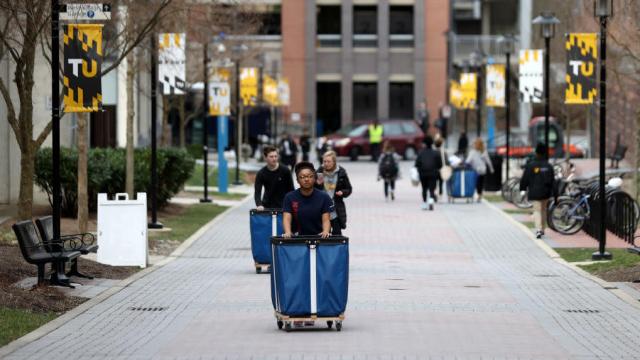Research institutions around the United States and abroad are reacting to the ongoing coronavirus pandemic by moving classes online, sending students and researchers home, and in some cases, closing labs. Among these various responses, graduate students and postdoctoral researchers are cutting off experiments midway, awaiting to hear whether their summer projects will be cancelled, and, in some cases, wondering whether their graduation dates will be postponed. Many are worried that the scientific establishment will simply forget about them.
“I hope journals, committees, funding bodies, etc., will be understanding in the future and will work with us so nobody falls through the cracks because of the pandemic,” Elena Blanco-Suárez, neuroscientist and postdoctoral researcher at the Salk Institute for Biological Studies in La Jolla, California, told Gizmodo. “It is bad enough as it is. This is a situation that is affecting everyone, and so we need to work together to get back on our feet.” Because researchers are often judged based on their output and publications, a months-long gap in their work could put them at a disadvantage when applying for positions or grants.
In some cases, researchers told Gizmodo that they had to end long-term experiments early, freeze tissue for future analyses, or continue experiments with less monitoring and the knowledge that they’ll need to repeat their work in the future. Blanco-Suárez’s work relies on studying mouse brains at specific time points, and the mice in her current trials will likely grow too old before she can return to her work. As for the mice, some of the researchers are caring for them when they can, and others may eventually have to euthanize them, Science reported.
[referenced url=” thumb=” title=” excerpt=”]
Emily Puckett, a PhD student who is doing research at the Max Planck Institute for Chemical Ecology in Germany, told Gizmodo that she had may have to repeat the first steps of her PhD research. “For me, this will be an annoying setback,” she told Gizmodo via Twitter, “but since I’m still relatively at the beginning of my PhD, I can maybe still make up the lost time. For senior PhDs in my institute, this may become more of an issue. Some are trying to finish experiments to submit papers that are crucial for writing the thesis. Some are already preparing for defences that may or may not happen.” Her department director decided to shut down the biochemistry department as a precaution.
One researcher, who asked to remain anonymous as she hadn’t gotten approval from her institute to talk to the media, told Gizmodo that she had to end most of her experiments in mice and that simply starting up again would take a long time. “My graduation date could very well be delayed by a year or more,” she told Gizmodo. “This gap in research could propagate forward into fewer or less impactful papers being written, which could have a negative impact on future job prospects.”
Other researchers, like master’s student Ada Marie McVean at McGill University in Montreal, expressed similar concerns, especially as a newer graduate student. She worried the disruptions caused by covid-19 would delay her by a semester or more, leading to her publish fewer papers as she pursued her degree and therefore influence her future prospects.
In one poll I posted on Facebook group for birders, 28 field technicians, graduate students, and avian biologists responded, many expressing frustration that they still didn’t know whether their summer field research would be cancelled or not. These projects are valuable both for their contribution to science as well as offering fieldwork experience for career development.
But the majority of the student researchers Gizmodo spoke to worried most about the health of themselves and their peers. Meg Massa, neuroscientist PhD candidate at University of California Los Angeles, told Gizmodo that she felt that UCLA had been doing a relatively good job demonstrating that administrators were clearly concerned with helping students while keeping the institute functioning. Blanco-Suárez also told Gizmodo that she’d seen a lot of sympathy and pushed deadlines to accommodate researchers.
Meanwhile, graduate students at other universities feel that they’ve been forgotten about by their institutions. In a guest column for The Chronicle, the Duke University student newspaper, PhD students and grad student union members Zollie Yavarow and Jeffrey Letourneau wrote that they were worried about how the pandemic would affect both their education and their finances—in some cases, students aren’t allowed to take on jobs outside their research, but they haven’t been guaranteed funding for the summer. Northwestern University’s graduate student union tweeted in frustration that the school had refused to shut down nonessential research activities in science laboratories, increasing students’ risk of exposure to the virus.
These issues, in many cases, only highlight the existing struggles faced by graduate students, especially here in the United States, where grad students receive low wages and sometimes unfair treatment by supervisors without any guarantee of a future in academia, reports Science. These struggles are highlighted by a wave of recent unionization efforts, especially since a 2016 National Labour Relations Board ruling that said “student assistants working at private colleges and universities are statutory employees covered by the National Labour Relations Act,” meaning that students at private universities are employees who can unionize.
The covid-19 pandemic and the accompanying social distancing could bring about long-term shifts in the way we live and the way researchers must conduct their work. Early career scientists are hoping that their institutes will be ready to accommodate them through these shifts.
